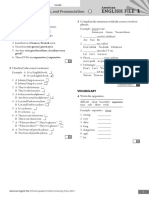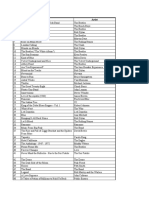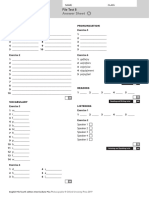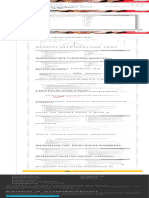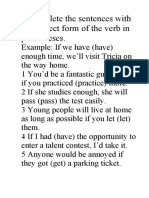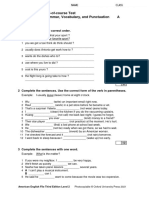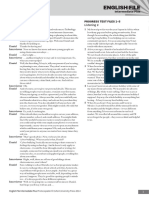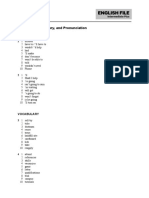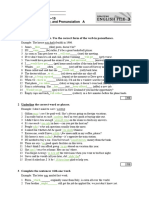Mid Exam 12
Mid Exam 12
Uploaded by
Quetzal Rojas PadillaCopyright:
Available Formats
Mid Exam 12
Mid Exam 12
Uploaded by
Quetzal Rojas PadillaOriginal Title
Copyright
Available Formats
Share this document
Did you find this document useful?
Is this content inappropriate?
Copyright:
Available Formats
Mid Exam 12
Mid Exam 12
Uploaded by
Quetzal Rojas PadillaCopyright:
Available Formats
MIDTERM EXAM LEVEL 12
GRAMMAR
Complete the sentences with the -ing form or the infinitive (with or without to) of the verb in brackets.
Example: She left without saying (say) goodbye.
1 I can’t believe you forgot ___to post_____ (post) that letter!
2 You’re really good at __writing______ (write) stories.
3 Javier doesn’t seem ____to enjoy____ (enjoy) sport very much.
4 Would you mind ___turning_____ (turn) your music down? I can’t concentrate.
5 I love __ not having______ (not / have) to write essays anymore.
6 Do you feel like ___going_____ (go) out for pizza tonight?
7 I’ve given up __to try______ (try) to make Don smile – he’s so miserable!
8 She asked Bill to go to the shop ____to get____ (get) a newspaper.
9 I remember __meeting______ (meet) Jane for the first time many years ago.
10 My boss refuses ___to give_____ (give) me a pay rise. I’m going to resign.
Complete the sentences with the correct form of the verb in brackets.
Example: If we had had (have) more time, we’d have visited Anne and Dave.
1 I ____would never have managed____ (never / manage) to buy a house if my parents hadn’t helped me
financially.
2 You wouldn’t have done so well in life if you ___hadn´t went_____ (not / go) to university.
3 We ____would have gotten____ (get) completely lost if a stranger hadn’t shown us the way.
4 If you’d run faster, we might __not have missed______ (not / miss) the bus.
5 He wouldn’t have crashed the car if he ____hadn´t answered____ (not / answer) his phone.
6 She ___would have worried_____ (worry) about you if you hadn’t phoned to say you were OK.
7 We could ___have looked after_____ (look after) the children last night if you’d asked.
8 He would have resigned if he ___hadn´t been_____ (not / be) promoted.
9 ___Would you have knew_____ (you / know) that was John if I hadn’t told you?
10 You wouldn’t have been so cold if you ____had wear____ (wear) a jacket.
Underline the correct word(s).
Example: A lot of / Many of people cheered when they heard the news.
1 I often get headaches because I spend too much / many hours on my computer.
2 Excuse me, this shirt isn’t enough big / big enough. Do you have a larger size?
3 We have no / none time for arguments. Just hurry up and do it!
4 I don’t like living in the city – there’s too much / many traffic.
5 They don’t have plenty / much money, but they’re still very generous.
6 There are not / no enough seats for everyone.
7 Very little / few money is being invested in the public health system.
8 I was going to have a biscuit, but there aren’t none / any.
9 There are very few / very little modern buildings in this town.
10 There isn’t enough room / room enough in this car. I need a bigger one.
VOCABULARY
Complete the sentences with the + or – adjective or adverb form of the noun in brackets.
Example: The bride and groom smiled happily (happiness) for their wedding photos.
1 You can have some ice cream for waiting so ___patient_____ (patience).
2 Walk ____carefully____ (care) here – it’s very icy.
3 Anna was so ___unlucky_____ (luck) to lose her suitcase in the airport.
4 I hate going in David’s car. He drives really ___uncareful_____ (care) and so fast!
5 This old knife is ____unuseful____ (use) – it doesn’t cut anything!
6 He knocked the vase off the desk, but ___luckily_____ (luck) I caught it before it hit the floor.
7 Don’t be so ____inpatient____ (patience). Dinner will be ready in a minute!
8 We missed the flight, but ____fortunately____ (fortune) we managed to get seats on the next one.
9 She was so tired, and the armchair was so ___comfortable_____ (comfort) that she fell asleep.
10 It was very ___fortunately_____ (fortune) that someone heard his shouts for help.
Write the word(s).
Example: A small button you press up and down to turn on electricity switch
1 The glass surface of a computer where the information appears. __screen________
2 Something you use when a plug won’t fit into a socket in another country. __________
3 The set of keys on a computer. ____password______
4 A small portable object for storing computer data. ___USB_______
5 A part of an electronic device that the sound comes out of. _____earpod_____
6 An object to control something from a distance. ___control_______
Underline the correct phrase. If both phrases are correct, put a tick ().
Example: Turn the radio up / Turn up the radio, will you? I can’t hear it!
1 The heating’s on too high. Could you turn it down / turn down it? ____
2 Could you plug the TV in / plug in the TV, please? ____
3 Don’t forget to switch your phone off / switch off your phone in the cinema. ____
4 Are you watching this TV or shall I turn off it / turn it off? ____
Underline the correct word(s).
Example: My current job is permanent / full-time / temporary. It’s a one-year contract.
1 Fantastic news! I’ve been retired / sacked / promoted!
2 My home-made clothes are selling well since I applied / set up / worked a website.
3 Jason’s sleeping late. He’s doing night shifts / hours / jobs at the factory this week.
4 I love being part-time / temporary / self-employed – I can work whenever I want to.
5 Sasha’s in charge / responsible / boss for the training department.
6 He doesn’t have regular / full-time / working hours. He often works in the evening.
7 Everyone will have to resign / be sacked / retire later in life in the future.
8 The problem is that I’m too unemployed / redundant / well qualified for many jobs
READING
1 Read the story and tick () A, B, or C.
Sylvie’s lucky mistake
When I left school, I went to England for the first time as an au pair in Newcastle-under-
Lyme, a market town about 150 miles north of London. I had booked a train ticket from
London to Newcastle online – it would take three hours and I would arrive in Newcastle
at 9.30 p.m. on the Sunday evening. The family who I would be working for would meet
me there.
When I was on the train, about halfway there, I asked a ticket inspector what time we
would arrive at Newcastle-under-Lyme. He looked at me and said ‘You’re going in the
wrong direction for Newcastle-under-Lyme. This train is going to Newcastle-upon-Tyne.’
I didn’t have very much English so it took a while for him to explain patiently that there
were two different towns, both called Newcastle, and the one I was going to was
unfortunately 200 miles further north than the one I needed to get to. As I was feeling
very anxious, I asked him what I should do. He told me there was no station in
Newcastle-under-Lyme, and that I would have to get off the train at York and take
another train to a town called Stoke-on-Trent. And then a bus.
When I got to York that evening, however, I discovered that there were no more trains
to Stoke-on-Trent until the next day. I was 17, from a small French village, and I had
never travelled on my own before. I also had very little money, not enough for even a
cheap hotel. I didn’t know what to do. I felt I was going to cry. Suddenly, a woman in her
40s, who had heard the conversation said, ‘Excuse me, but if you need somewhere to
stay in York, I live here with my family. We have a spare room and you’re welcome to
stay with us.’
I often think, if there had been a station at Newcastle-under-Lyme, or if I had known
more about English geography, or if I’d been less careless about my booking, I wouldn’t
have got on that train. So then I wouldn’t have met Jill, the lady from York. And if she
hadn’t been so kind, I wouldn’t have stayed with her. Oh, and obviously I wouldn’t
eventually have married Ben, her son!
Example: Sylvie first visited England when she was 18.
A True c B False c C Doesn’t say c
1 Sylvie bought a return ticket from Newcastle to London.
A True c B False c C Doesn’t say
2 The English family was planning to meet her when she got to Newcastle.
A True B False c C Doesn’t say c
3 When she spoke to the ticket inspector, she realized that she had travelled too far south.
A True c B False c C Doesn’t say
4 The nearest train station to Newcastle-under-Lyme is Stoke-on-Trent.
A True B False c C Doesn’t say c
5 The inspector advised her to get another train the next morning.
A True c B False C Doesn’t say c
6 Sylvie wasn’t worried about where she could stay that night.
A True c B False C Doesn’t say c
7 A woman offered her a bed in her spare room.
A True B False c C Doesn’t say c
8 Sylvie feels that her life changed because she hadn’t booked her train carefully.
A True B False c C Doesn’t say c
9 Jill kindly lent Sylvie some money.
A True c B False C Doesn’t say c
10 Sylvie is now Jill’s mother-in-law.
A True c B False C Doesn’t say c
LISTENING
1 Listen to a radio programme about saving energy. Complete the sentences with one or
two words. You may have to change the form of the words you hear.
1 Matthew decided to __change_______ the way he uses gas and electricity.
2 He says that not turning off the TV at the socket ___still wasting_____ energy.
3 He thinks another good idea is to ____turn down_a little time_____ the central heating.
4 Using a special plug for your ____energy bulb______ can control its energy use.
5 He is very ___proud_____ that he is helping to save the planet.
WRITING
Write a story about an interesting encounter with a stranger (or invent one) (140–180
words). Answer the questions.
• Set the scene: When was it? Where were you? What were you doing?
• Tell the story: Who did you meet? How? What happened?
• Conclude: Did it change your life in any way?
When I was on my first semester of University, I had few friends because it was a new school for
me, so my close friend those days was Diego, he continue being my friend now but he is a kind
of strange but funny people, so I remembered that one day, we didn´t have homework, so we
stay in the school all the afternoon and we got a little bit bored, so he had the idea to search
people that seems good and made their our friends.
After a time, we saw a girl that was alone on a table of the library and we decide to seat between
her and started talking with her, obviously she thought that we were strange but then, she started
smiling and at the end we made us friend. Her name is Karen and we called her “Karen
Negocios” because of her degree, and now she continues being our friend and all the time that
we see us in the campus, we say hello, very friendly. I think that you sometimes can meet some
people with different ways, but is it more different or strange, it would be a good way to know
that your friendship wouldn´t be easily to be forgotten.
You might also like
- Signal Moon A Short Story (Kate Quinn)Document50 pagesSignal Moon A Short Story (Kate Quinn)Farzana Pearl100% (1)
- FINAL Oct 2023Document7 pagesFINAL Oct 2023henryNo ratings yet
- AEF1 File2 TestB (WWW - Languagecentre.ir)Document4 pagesAEF1 File2 TestB (WWW - Languagecentre.ir)FahimehNo ratings yet
- Rolling Stone's Top 500 Albums of All TimeDocument11 pagesRolling Stone's Top 500 Albums of All Timemarklauritsen50% (2)
- EF4e Intplus Filetest 8A AnswersheetDocument1 pageEF4e Intplus Filetest 8A AnswersheetLorena RiveraNo ratings yet
- EF3e Intplus Filetest 3bDocument5 pagesEF3e Intplus Filetest 3bСултан АбдиNo ratings yet
- Nef - Pi - End of Course Test - Grammar 1 Complete The Sentences. Use The Correct Form of The Verb in BracketsDocument4 pagesNef - Pi - End of Course Test - Grammar 1 Complete The Sentences. Use The Correct Form of The Verb in Bracketsمتعلم لغة أنجليزية100% (1)
- Test 1Document4 pagesTest 1BélaNo ratings yet
- 9 Grammar, Vocabulary, and Pronunciation ADocument6 pages9 Grammar, Vocabulary, and Pronunciation ANorbert VonnákNo ratings yet
- EF3e Int Endtest ADocument9 pagesEF3e Int Endtest AsokolovavaleriqNo ratings yet
- EF3e Int Endtest AnswerkeyDocument8 pagesEF3e Int Endtest Answerkeytsmak2701No ratings yet
- Test 5 Int - CorregidoDocument8 pagesTest 5 Int - CorregidoESTUDIO JURIDICO IMBRIANO FERREYRONo ratings yet
- EF3e Int Filetest 9bDocument6 pagesEF3e Int Filetest 9btsmak2701No ratings yet
- Final ExamDocument4 pagesFinal ExamHector LeonNo ratings yet
- 3 VariantDocument9 pages3 VariantСемейный аккаунтNo ratings yet
- Ef3e Adv Filetest 03b PDF - CompressDocument5 pagesEf3e Adv Filetest 03b PDF - CompressHamed NoofalNo ratings yet
- EF3e Test Units 1A&B PDFDocument6 pagesEF3e Test Units 1A&B PDFPiya NaraNo ratings yet
- EF3e Preint Filetest 8aDocument7 pagesEF3e Preint Filetest 8aandrii.b80No ratings yet
- Pre-Intermediate End-Of-Course Exam Answers A, BDocument1 pagePre-Intermediate End-Of-Course Exam Answers A, Bbekkarayeva87No ratings yet
- Test 7Document11 pagesTest 7ЛевNo ratings yet
- Cap7 12Document13 pagesCap7 12Amanda Basilio RomanoNo ratings yet
- AEF3e L2 Endtest ADocument9 pagesAEF3e L2 Endtest AMarla JailerNo ratings yet
- EF3e Intplus Filetest 04aDocument4 pagesEF3e Intplus Filetest 04aЯна ИвановаNo ratings yet
- EIC 3 Practice Exercises Unit 4Document3 pagesEIC 3 Practice Exercises Unit 4Trần ChâuNo ratings yet
- Test 4 Javier PugaDocument5 pagesTest 4 Javier Pugasantosantiago80gmail.com100% (1)
- EF3e Preint Filetest 01a Answer Sheet PDFDocument1 pageEF3e Preint Filetest 01a Answer Sheet PDFDiego Real Torres NinaNo ratings yet
- 6 Grammar, Vocabulary, and Pronunciation BDocument7 pages6 Grammar, Vocabulary, and Pronunciation BCamila Andrea Olivero ArayaNo ratings yet
- ДискDocument5 pagesДискЮлия ДорошеваNo ratings yet
- EF3e Int Progresstest 1 5a Answer Sheet PDFDocument2 pagesEF3e Int Progresstest 1 5a Answer Sheet PDFSol LombardiNo ratings yet
- EF3e Intplus Filetest 02 AnswerkeyDocument4 pagesEF3e Intplus Filetest 02 AnswerkeyMoldir100% (1)
- EF3e Preint Quicktest 11Document3 pagesEF3e Preint Quicktest 11María Emilce LópezNo ratings yet
- Int File Tests With Key 2Document129 pagesInt File Tests With Key 2h4bnrtgyrfNo ratings yet
- 2 Grammar, Vocabulary, and Pronunciation ADocument7 pages2 Grammar, Vocabulary, and Pronunciation ARo100% (2)
- Grammar 1 Write The Comparative or Superlative FormDocument3 pagesGrammar 1 Write The Comparative or Superlative FormKincső NagyNo ratings yet
- File Test 2 Grammar, Vocabulary, and Pronunciation ADocument8 pagesFile Test 2 Grammar, Vocabulary, and Pronunciation ABojana DimitrievaNo ratings yet
- EF3e Beg Filetest 08 ADocument6 pagesEF3e Beg Filetest 08 AImene FatnassiNo ratings yet
- EF3e Intplus Filetest 05 AnswerkeyDocument6 pagesEF3e Intplus Filetest 05 Answerkeytsmak2701No ratings yet
- EF3e Intplus Progresstest Listeningscript PDFDocument2 pagesEF3e Intplus Progresstest Listeningscript PDFMariaVLNo ratings yet
- Nef Int Filetest 7aDocument6 pagesNef Int Filetest 7aMilagros Escobar LeyvaNo ratings yet
- EF3e Intplus Filetest 04 AnswerkeyDocument6 pagesEF3e Intplus Filetest 04 AnswerkeyЯна ИвановаNo ratings yet
- EF4e Int Progresstest 1 5BDocument9 pagesEF4e Int Progresstest 1 5BAlan CasalsNo ratings yet
- English File: Grammar, Vocabulary, and PronunciationDocument6 pagesEnglish File: Grammar, Vocabulary, and PronunciationRina M.No ratings yet
- Second Unit Exam Pre Inter 5Document6 pagesSecond Unit Exam Pre Inter 5Ray Caleb Pérez De La SotaNo ratings yet
- EF3e Adv Quicktest 01 Overlay PDFDocument1 pageEF3e Adv Quicktest 01 Overlay PDFSweet PotatoNo ratings yet
- Nef Int Tacd TestsDocument5 pagesNef Int Tacd TestsSergey Skryabin100% (2)
- EF3e Int Progresstest 6 10bDocument7 pagesEF3e Int Progresstest 6 10bIrena BykovaNo ratings yet
- EF3e Adv Quicktest 09 Answer SheetDocument1 pageEF3e Adv Quicktest 09 Answer SheetjuliNo ratings yet
- Test File 1: Grammar 1 Order The Words To Make Questions and SentencesDocument6 pagesTest File 1: Grammar 1 Order The Words To Make Questions and SentencesPetarNo ratings yet
- AEF0 File8 TestA&B AnswerKey PDFDocument4 pagesAEF0 File8 TestA&B AnswerKey PDFDIEGO TORRES NINANo ratings yet
- English File Test 9ADocument4 pagesEnglish File Test 9AAnii KvirkveliaNo ratings yet
- AEF3 Files6-10 ProgTestA CustomDocument8 pagesAEF3 Files6-10 ProgTestA Customaria3taryNo ratings yet
- EnglishFile4e Intermediate Plus TG PCM Vocab 1BDocument1 pageEnglishFile4e Intermediate Plus TG PCM Vocab 1Bayşe adaliNo ratings yet
- Grammar Practice 9BDocument1 pageGrammar Practice 9BSofia SendinNo ratings yet
- EF 3rd Upper Interm File 8 TEST PDFDocument4 pagesEF 3rd Upper Interm File 8 TEST PDFfriboNo ratings yet
- EIC 3 Practice Exercises Unit 3Document4 pagesEIC 3 Practice Exercises Unit 3Trần ChâuNo ratings yet
- Reading 1 Read The Article and Tick ( ) A, B, or C.: Georgina - Anna's GrandmotherDocument2 pagesReading 1 Read The Article and Tick ( ) A, B, or C.: Georgina - Anna's GrandmotherVenyuory ChhunNo ratings yet
- English File: Answer KeyDocument4 pagesEnglish File: Answer KeyPatinéNo ratings yet
- EF3e Int Filetest 10 AnswerkeyDocument6 pagesEF3e Int Filetest 10 Answerkeytsmak2701No ratings yet
- Unit Test 8B: 1 Complete The Sentences With The - Ing Form or The Infinitive of The VerbDocument4 pagesUnit Test 8B: 1 Complete The Sentences With The - Ing Form or The Infinitive of The VerbjojoNo ratings yet
- Intermediate Test Units 8 and 9 LíviaDocument4 pagesIntermediate Test Units 8 and 9 LíviaJade BahmadNo ratings yet
- EIC 4 Practice Exercises Unit 9Document6 pagesEIC 4 Practice Exercises Unit 9Ngọc Lê Thị Hồng100% (1)
- Exam Inter 9-10Document4 pagesExam Inter 9-10lievanos.iqNo ratings yet
- WrittingDocument1 pageWrittingQuetzal Rojas PadillaNo ratings yet
- Mid Test Upper 1Document7 pagesMid Test Upper 1Quetzal Rojas PadillaNo ratings yet
- Final Exam Level 12Document5 pagesFinal Exam Level 12Quetzal Rojas PadillaNo ratings yet
- Final Ex Lev 10Document3 pagesFinal Ex Lev 10Quetzal Rojas PadillaNo ratings yet
- Final Test Level 11Document4 pagesFinal Test Level 11Quetzal Rojas PadillaNo ratings yet
- Mid Exam Level 11Document6 pagesMid Exam Level 11Quetzal Rojas PadillaNo ratings yet
- Data and SignalsDocument91 pagesData and SignalsI KaizokuNo ratings yet
- BridgesDocument36 pagesBridgesSakshi AngelNo ratings yet
- E A F C: "SHE LOOKS SO PERFECT" (Easy Version)Document1 pageE A F C: "SHE LOOKS SO PERFECT" (Easy Version)Travis CucklerNo ratings yet
- Long Quiz in Music 7 Q3Document3 pagesLong Quiz in Music 7 Q3Precious Nowelene Venturina100% (1)
- Area of Composite Figures - Day 2 - HomeworkDocument2 pagesArea of Composite Figures - Day 2 - HomeworkCyan AbaraNo ratings yet
- Pink - Panther Alto - SaxDocument4 pagesPink - Panther Alto - SaxDominik GuraNo ratings yet
- Becalmed Robin Beanland Anglo ConcertinaDocument2 pagesBecalmed Robin Beanland Anglo ConcertinaNecro LordNo ratings yet
- It's A Hi-5 Christmas CD: DownloadDocument3 pagesIt's A Hi-5 Christmas CD: DownloadFrank CLNo ratings yet
- The First NoelDocument2 pagesThe First NoelAlexNo ratings yet
- Presentation Bi PPDocument8 pagesPresentation Bi PPNUR AMIRAH BINTI MOHD RIZAL MoeNo ratings yet
- Euphonium CurriculumDocument2 pagesEuphonium Curriculumvic pezzNo ratings yet
- Musical Instrument With One (Or More) Button(s)Document11 pagesMusical Instrument With One (Or More) Button(s)Vanissa LawNo ratings yet
- AirDocument3 pagesAirROBINNo ratings yet
- RSA-White-Paper-Defining-the-CBTC-over-LTE-Interface-Riding-the-WaveDocument9 pagesRSA-White-Paper-Defining-the-CBTC-over-LTE-Interface-Riding-the-WaveRoopavathy ManiNo ratings yet
- Module 1 Ge 5 1Document5 pagesModule 1 Ge 5 1Jaspher HernandezNo ratings yet
- EF4e Elem End of Course Test ADocument6 pagesEF4e Elem End of Course Test AahmedNo ratings yet
- Descriptive Agnes MonicaDocument3 pagesDescriptive Agnes Monicadesty hukiNo ratings yet
- De Cuong Anh 10 Global Nam Hoc 24 25Document11 pagesDe Cuong Anh 10 Global Nam Hoc 24 25Tran DoNo ratings yet
- live_streamsDocument9 pageslive_streamsmiguelargolo222No ratings yet
- Survey and Challenges of Li-Fi With Comparison of Wi-Fi: March 2016Document5 pagesSurvey and Challenges of Li-Fi With Comparison of Wi-Fi: March 2016Naidan DensmaaNo ratings yet
- DLL 4TH Quarter 40TH Week Mapeh March 12-16, 2018Document5 pagesDLL 4TH Quarter 40TH Week Mapeh March 12-16, 2018angeliNo ratings yet
- XP-30 OmDocument216 pagesXP-30 OmbangjongzzzNo ratings yet
- Piter - LR - Pure Tone Audiometry and MaskingDocument44 pagesPiter - LR - Pure Tone Audiometry and MaskingArief FakhrizalNo ratings yet
- Black History Reading ListDocument23 pagesBlack History Reading ListNaeem Gul100% (7)
- UntitledDocument12 pagesUntitledRakshit SharmaNo ratings yet
- PNP Key Personnel As of November 2 2023 2Document14 pagesPNP Key Personnel As of November 2 2023 2emanzerepNo ratings yet
- Himno de Barranquilla PDFDocument7 pagesHimno de Barranquilla PDFEliana Ramos RealesNo ratings yet
- Bublè - Lost ChordsDocument2 pagesBublè - Lost ChordsDavideContiNo ratings yet


